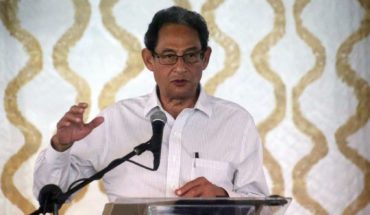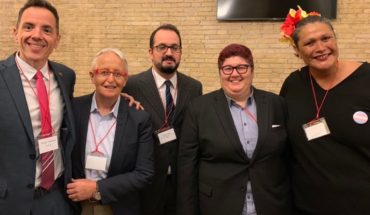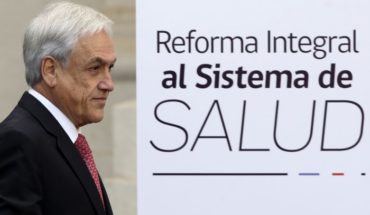then triumph of the now President-elect Andrés Manuel López Obrador, different members of his close team reported that the “amnesty” to pacify the country, announced in campaign, will consist in reality of a much wider plan of actions to which the name process of ‘transitional justice’… but, what is that?
To understand what politicians mean when they speak of “transitional justice”, Animal politician was approached by a person who is a specialist in the subject not just because in their country of origin is a fundamental part of a peace process similar to that raised the future Mexican authorities, but also because that country, Colombia, Mexico shares some features on domestic violence.
This specialist is Xiomara Balanta Moreno, Vice President of special jurisdiction for peace (the organ created by the Colombian judiciary for crimes committed in the framework of the war with the FARC, after the signing of the peace with the guerrilla group). Within the judicial structure, Xiomara Balanta is also President of the Hall of amnesty or pardon, i.e., the Court granted forgiveness for such crimes, should appropriate this benefit.
To understand the concept of “transitional justice”, explains the Minister Balanta, first you have to understand what kind of transition refers to the term, “and what is normally meant by transition in this matter are the steps that occur from war to peace” i.e., it is a process that requires a cessation of hostilities, in the context of an internal armed conflict.
However, stressed the Minister, the case of Colombia is an example “sui generis”, since, even if a peace agreement is signed in 2016 with the oldest guerrilla of the country, continuing the warlike confrontation with “various illegal armed groups, FARC were only one e” screws, then, this is trying to make peace in the middle of the war, it is not easy. We are trying to apply a transitional justice, without transition”.
What can you forgive?
In Mexico, none of the actions announced to date by the next federal authorities involves the signing of a peace agreement with the organized crime groups that maintain a confrontation with security forces, armed by what the attempt Colombian “make peace in the midst of the war” could be considered a trait in common with the Mexican “transitional justice” process.
However, warned judge Balanta, Colombia’s internal conflict “is different to what you are now living in Mexico”.
The first clear difference regarding the Mexican conflict is that in Colombia there was a prior will of the FARC by lay down their arms, something that has not been raised by authorities, nor by the organized crime groups in Mexico.
“To be able to sit down to dialogue and reach a stable and long – lasting peace says the Minister Bolanta-, it is necessary to establish benefits for those who are submitted on a voluntary basis, i.e. for those who decide to lay down their arms voluntarily, there begins the” transit from war to peace, and in Colombia the process of delivery of the weapons was verified directly by the Organization of the United Nations”.
As pointed out the law 1820, issued in Colombia to regulate the granting of amnesties, forgiveness is not general, but that both sides in the conflict agreed that this applied only to certain offences, which they called “politicians”, and exceptionally “ordinary crimes”, if they were committed in the context of the armed conflict.
Thus, for example, in Colombia is given forgiveness to the FARC guerrillas who took part in acts such as rebellion, theft of aircraft, espionage and financing activities of the rebellion (including drug trafficking) or participation in fighting.
Even given amnesty to those who killed other people, if these occurred directly or indirectly in the context of the armed conflict with the FARC, and if these deaths not violated international humanitarian law (as it could be when he incurred in) execution of prisoners or death by denial of humanitarian assistance).
However, at the same time, the guerrillas of the FARC accepted that it is fincara its members to criminal responsibility, without the possibility of forgiveness, if they incurred in “crimes against humanity, genocide, serious war crimes, taking of hostages or other severe deprivation freedom, torture, extrajudicial executions, enforced disappearance, violent carnal access and other forms of sexual violence, child abduction, forced displacement, as well as the recruitment of minors”.
All these crimes were outside the amnesty in Colombia, explains the manistrada Bolanta, because international law prohibits granting forgiveness to those serious facts, “crimes there are Amnesty and others which are not, and that determines international standards of which Colombia is respectful.”
Although elected officials in Mexico have not specified to what crimes is intended to grant the benefit of the Amnesty once they enter functions, the victims that were searching for approaches are precisely those which, in the context of the war on drugs they have suffered such offences which, under international law, can not be forgiven.
Do forgive organized crime?
Unlike Colombia, conflict affecting Mexico is not among the official forces and armed political groups, but is the confrontation with armed openly organized crime groups.
However, recognizes judge Xiomara Bolanta, “it is clear that Colombia has suffered the scourge of drug trafficking for many years, and although the armed conflict has not been oblivious to this situation, drug trafficking and armed conflict are two different things.”
In fact, underlines the judge, “the peace agreement that was signed in Colombia is an internal armed conflict, according to the international standards for the protection of human rights, but drug trafficking is not a fact that generate that kind of application of the rules. Drug trafficking is a crime transnational, that has nothing to do with the Declaration of an internal armed conflict, nor the application of rules in the light of international humanitarian law”.
That is to say that, in general, the international framework established in which armed conflict types are applicable amnesties, does not provide for its application in confrontations with groups of drug traffickers.
However, Bolanta Minister designates, in Colombia Yes apply the amnesty for activities like drug trafficking, when proven that these were developed by FARC guerrillas not for personal profit but to finance its activities guerrilla.
“The room of Amnesty and pardon has a very strong task – details the Colombian Minister-: to be understood when the drug can have a nexus of causality with the armed conflict, when the crime of drug trafficking had a direct or indirect relationship with” events that are related to the armed conflict (…) If evidential material determined to me that trafficking of drugs that a member of the FARC was doing was for its own benefit and not to finance the FARC, would have to receive Amnesty?”
Authorities autoamnistiadas although originally the agreement signed between the Colombian Government and the FARC stated that also would be subjected to court members of the public forces, and civilians who took part in the armed conflict, and incurred crimes, a subsequent agreement of the Congress of that country determined that the appearance to the courts will be voluntary and compulsory for guerrillas to civil servants, police, military and civilians involved.
“- Says the Colombian Minister – in my country there is currently a legal limbo, because the new law’s procedures gave time to the State to create a new institution that is responsible for judging them.” That is not as clear as it should be”.
However, says, “I can tell you that today, in Colombia, currently is being conducted a hearing of voluntary submission of members of security forces, who possibly committed what we call false positive performances” extrajudicial. I.e., while the appearance was voluntary, it has been well received by the members of the security forces being investigated, processed, for that type of crime”.
-Is not to rely too much on the good will? -asked.
-Yes – it recognizes.
Independence although the agreement with the Colombian Minister is not asking comment on Mexico, but only on the peace process in his country, the interview concludes with a query: would “topics would propose you keep in mind to Mexicans, to a process of”? transitional justice?”
“I would say – says – that Mexico needs to know where its missing. That is the opinion of a Colombian. And so you have to have a search unit, if they already have it should strengthen it, or create a new one, and you must have all the institutional support and the support of the civilian population.”
This search unit, and any institution deemed necessary to implement a process of transitional justice, notes, “must be made up of elected people of independent, autonomous processes in which the State does not have” capacity management, and generate the independence necessary for the development of its activities”.
In Colombia, it shows example, Ministers of the special jurisdiction for peace were elected by judges of other countries.
“I am one of the first black women that has Colombia – points-, am a woman and am young, and my choice had not happened, if not a change, had decided to secure independence. It is important to ensure gender and plurality. In a diverse country, their cuts should give sample that diversity”, withcluded.
translated from Spanish: What is transitional justice proposed by AMLO
August 20, 2018 |





